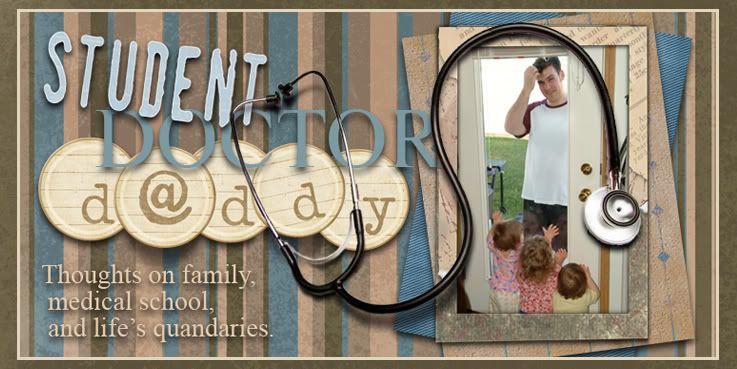A few months ago I was on a Pain and Palliative care rotation. Honestly I took that rotation because I have already become too skeptical of pain. Sometimes I feel that in the hospital and especially the er we treat patients that come in with pain as drug seekers until proven otherwise. While there is a fair amount of that going on and such people for the most part are easy to spot, there is another population who cannot have any meaningful quality of life without regular doses or Dilaudid, morphine, OxyContin, Percocet, and other narcotics. I took the rotation to learn how to exercise proper relief of pain especially since I am going into surgery and will be inflicting varying degrees of it on my patients. I got a lot more from that rotation than I bargained for.
Palliative medicine is about providing comfort and increasing quality of life for people facing the end of their mortal existence. Doctors in the field routinely have some of the most difficult discussion that patients are confronted with: 'what do you hope to accomplish with your remaining time' 'how do you want to spend the time you have left?' ' do you want us to perform CPR in the event that your heart stops?' Do you want us to put a tube in you and hook you up to a machine if you can't breath on your own?' ' do you want to be at home, a facility or a hospital' these are just some of the questions that may get asked. I have seen multiple patients with stage 4 cancer who have had it for months and have very little time left. Surprisingly, most of the patients have no formal documents in place to express their wishes in the event they are incapacitated.
Most people envision themselves dying at home, comfortable and surrounded by loved ones. The reality is most americans die in hospitals with a good number of those surrounded by staff sticking them with lines, filling them with fluids and meds, breathing for them with a mask, shocking them with paddles with a med student pumping on their chest. ON TV the patient seems to make it 90% of the time. In reality only 15% of otherwise healthy patients survive and half of those will have lasting effects. Survival drops practically to 0% in patients with end stage cancer, heart failure or other terminal conditions.
I have seen people die a few times as a med student. I have been a part of resuscitative efforts, compressing someone’s chest and trying to not drip sweat on them after the fifth round of two hundred chest compressions, feeling ribs crunch and break under the weight of my hands as I try to pump their heart at 100 beats per minute to the tune of 'staying alive' or "another one bites the dust", my arms burning with fatigue and watching the monitor to make sure my compressions register. Occasionally the attending will ask me if I think the EKG rhythm is shockable or which drug should be pushed next. (it will be expected of me to run a code by myself in a few months when i graduate) Ultimately an attending decides that the physical efforts are futile and calls the time of death. The patient was likely gone long before that. I remember staring into the half open eyes of one of these patients and thinking there was nothing there. Contrast that with another experience I say at an inpatient hospice center: the patient expires peacefully in a quiet environment with their loved ones nearby.
Death is a process. From a medical stand point it takes a while for body systems to shut down. Many of the cellular processes continue for hours after that. In the active phase of dying the heart rate and respiratory rate increases. The temperature can rise. Patients can switch from restless to sleeping in minutes. Ultimately the breathing becomes sporadic. The blood pressure drops and the patient becomes obtunded as there is not enough circulation to keep the brain going. The process can take minutes to hours in the final stages. Some of the docs and nurses have commented to me that the patient actually looks smaller when they die as if a part of them has left.
The doctors I worked with help to make this transition as peaceful as possible, providing pain meds to help with breathing discomfort, drugs to help dry up throat secretions so the patient doesn't choke, and sedatives to help with agitation or restlessness. The meds do not speed up the process of dying. These patients can be at home and have their families around them.
The word hospice in our culture has had a negative connotation. I think many people feel that hospice is 'giving up.'? I definitely don't see it that way. I see it as a dignified way to have a little control over our last moments of mortality.
Subscribe to:
Post Comments (Atom)


1 comment:
What an experience you're having! Every human emotion must pass through those doors at some point in time. Glad you're up to it, Zach! Love you,
Mom Gale
Post a Comment